Sociology 1210 Summer 2019 RE-TAKE Exam 2: Education and Leadership
VerifiedAdded on 2022/10/10
|8
|1552
|41
Homework Assignment
AI Summary
This sociology assignment explores the perpetuation of class differences in high schools through the lens of conflict theory, analyzing how school funding and practices contribute to social inequality. The assignment then identifies the conflict theory as the most relevant sociological perspective for understanding the student's view of education, explaining the theory's emphasis on power struggles and inequalities. Finally, the paper examines charismatic authority by comparing Adolf Hitler and Jesus Christ, highlighting how both leaders, despite their divergent ideologies, utilized charisma to influence and lead others. The assignment draws on sociological concepts and theories to analyze the impact of education and leadership on society, providing a comprehensive overview of the topics.
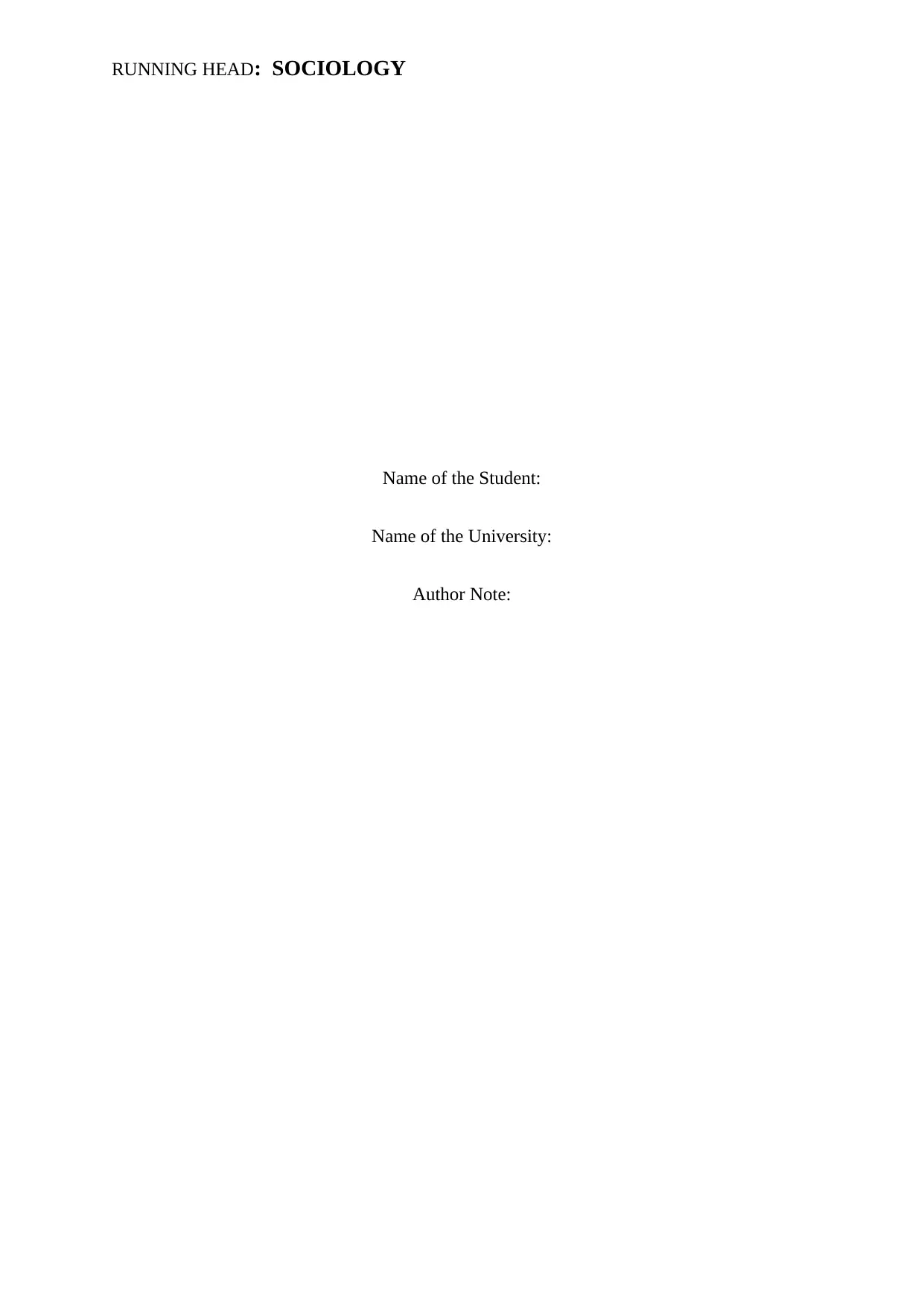
RUNNING HEAD: SOCIOLOGY
Name of the Student:
Name of the University:
Author Note:
Name of the Student:
Name of the University:
Author Note:
Paraphrase This Document
Need a fresh take? Get an instant paraphrase of this document with our AI Paraphraser
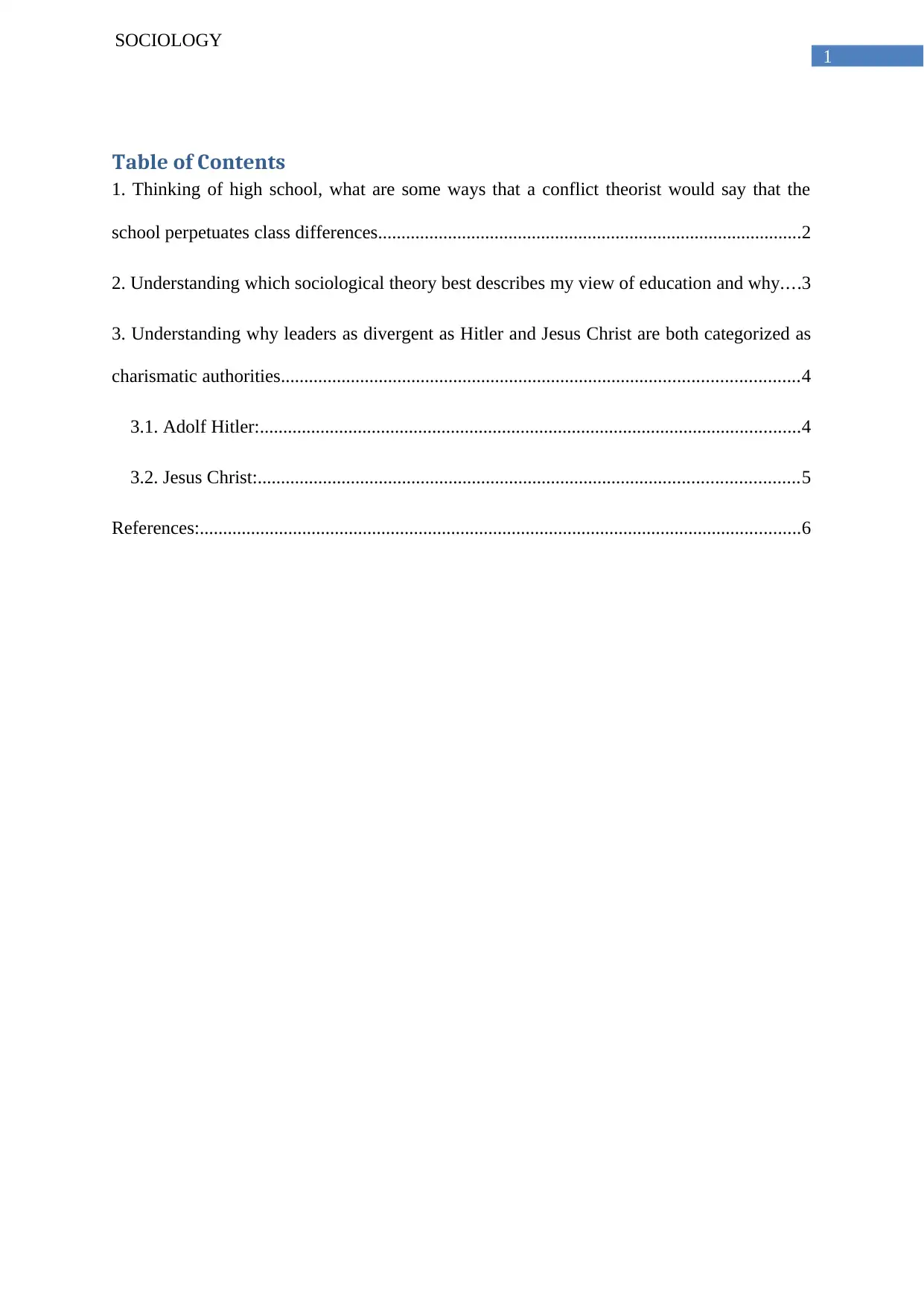
1
SOCIOLOGY
Table of Contents
1. Thinking of high school, what are some ways that a conflict theorist would say that the
school perpetuates class differences...........................................................................................2
2. Understanding which sociological theory best describes my view of education and why....3
3. Understanding why leaders as divergent as Hitler and Jesus Christ are both categorized as
charismatic authorities...............................................................................................................4
3.1. Adolf Hitler:....................................................................................................................4
3.2. Jesus Christ:....................................................................................................................5
References:.................................................................................................................................6
SOCIOLOGY
Table of Contents
1. Thinking of high school, what are some ways that a conflict theorist would say that the
school perpetuates class differences...........................................................................................2
2. Understanding which sociological theory best describes my view of education and why....3
3. Understanding why leaders as divergent as Hitler and Jesus Christ are both categorized as
charismatic authorities...............................................................................................................4
3.1. Adolf Hitler:....................................................................................................................4
3.2. Jesus Christ:....................................................................................................................5
References:.................................................................................................................................6
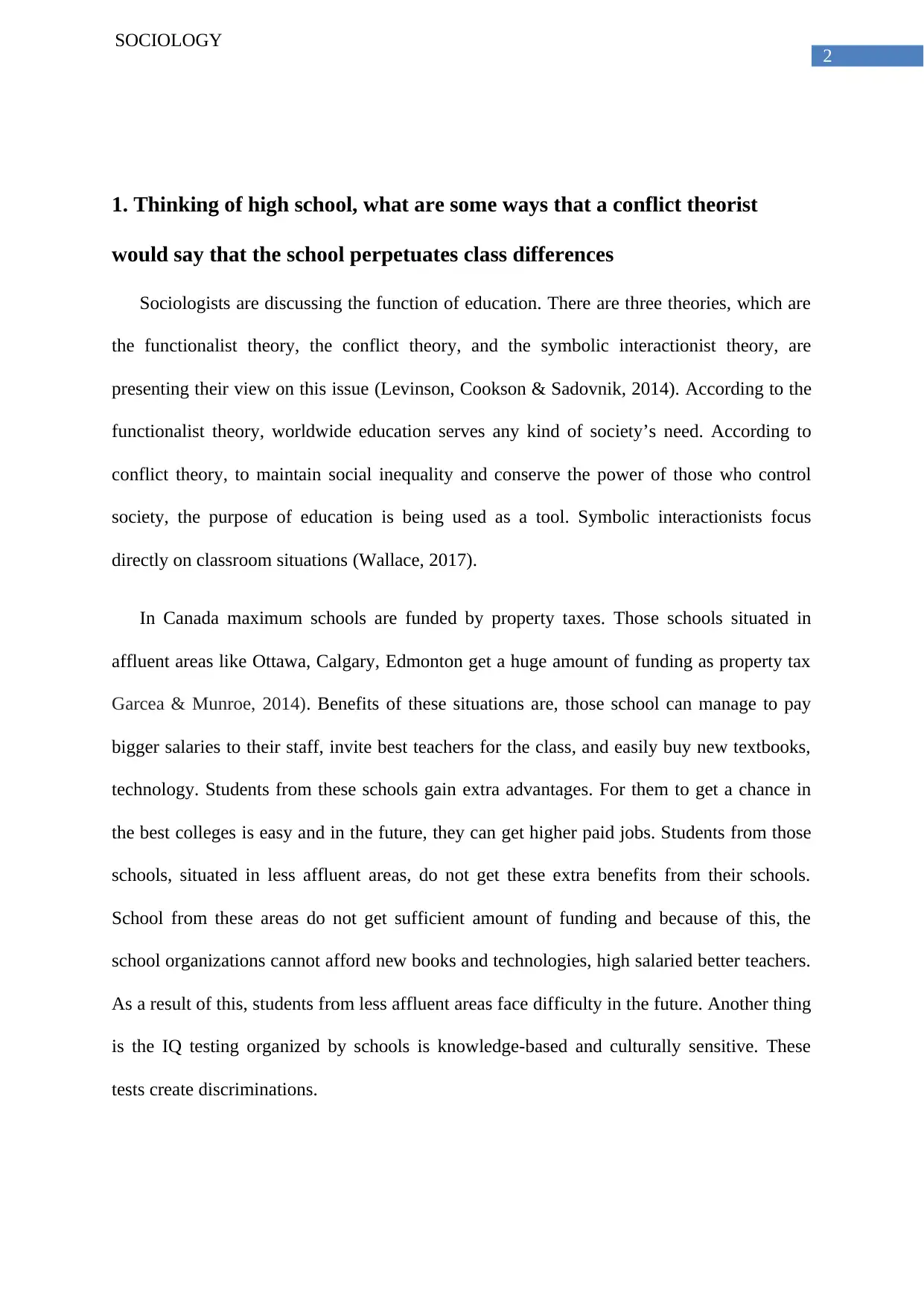
2
SOCIOLOGY
1. Thinking of high school, what are some ways that a conflict theorist
would say that the school perpetuates class differences
Sociologists are discussing the function of education. There are three theories, which are
the functionalist theory, the conflict theory, and the symbolic interactionist theory, are
presenting their view on this issue (Levinson, Cookson & Sadovnik, 2014). According to the
functionalist theory, worldwide education serves any kind of society’s need. According to
conflict theory, to maintain social inequality and conserve the power of those who control
society, the purpose of education is being used as a tool. Symbolic interactionists focus
directly on classroom situations (Wallace, 2017).
In Canada maximum schools are funded by property taxes. Those schools situated in
affluent areas like Ottawa, Calgary, Edmonton get a huge amount of funding as property tax
Garcea & Munroe, 2014). Benefits of these situations are, those school can manage to pay
bigger salaries to their staff, invite best teachers for the class, and easily buy new textbooks,
technology. Students from these schools gain extra advantages. For them to get a chance in
the best colleges is easy and in the future, they can get higher paid jobs. Students from those
schools, situated in less affluent areas, do not get these extra benefits from their schools.
School from these areas do not get sufficient amount of funding and because of this, the
school organizations cannot afford new books and technologies, high salaried better teachers.
As a result of this, students from less affluent areas face difficulty in the future. Another thing
is the IQ testing organized by schools is knowledge-based and culturally sensitive. These
tests create discriminations.
SOCIOLOGY
1. Thinking of high school, what are some ways that a conflict theorist
would say that the school perpetuates class differences
Sociologists are discussing the function of education. There are three theories, which are
the functionalist theory, the conflict theory, and the symbolic interactionist theory, are
presenting their view on this issue (Levinson, Cookson & Sadovnik, 2014). According to the
functionalist theory, worldwide education serves any kind of society’s need. According to
conflict theory, to maintain social inequality and conserve the power of those who control
society, the purpose of education is being used as a tool. Symbolic interactionists focus
directly on classroom situations (Wallace, 2017).
In Canada maximum schools are funded by property taxes. Those schools situated in
affluent areas like Ottawa, Calgary, Edmonton get a huge amount of funding as property tax
Garcea & Munroe, 2014). Benefits of these situations are, those school can manage to pay
bigger salaries to their staff, invite best teachers for the class, and easily buy new textbooks,
technology. Students from these schools gain extra advantages. For them to get a chance in
the best colleges is easy and in the future, they can get higher paid jobs. Students from those
schools, situated in less affluent areas, do not get these extra benefits from their schools.
School from these areas do not get sufficient amount of funding and because of this, the
school organizations cannot afford new books and technologies, high salaried better teachers.
As a result of this, students from less affluent areas face difficulty in the future. Another thing
is the IQ testing organized by schools is knowledge-based and culturally sensitive. These
tests create discriminations.
⊘ This is a preview!⊘
Do you want full access?
Subscribe today to unlock all pages.

Trusted by 1+ million students worldwide
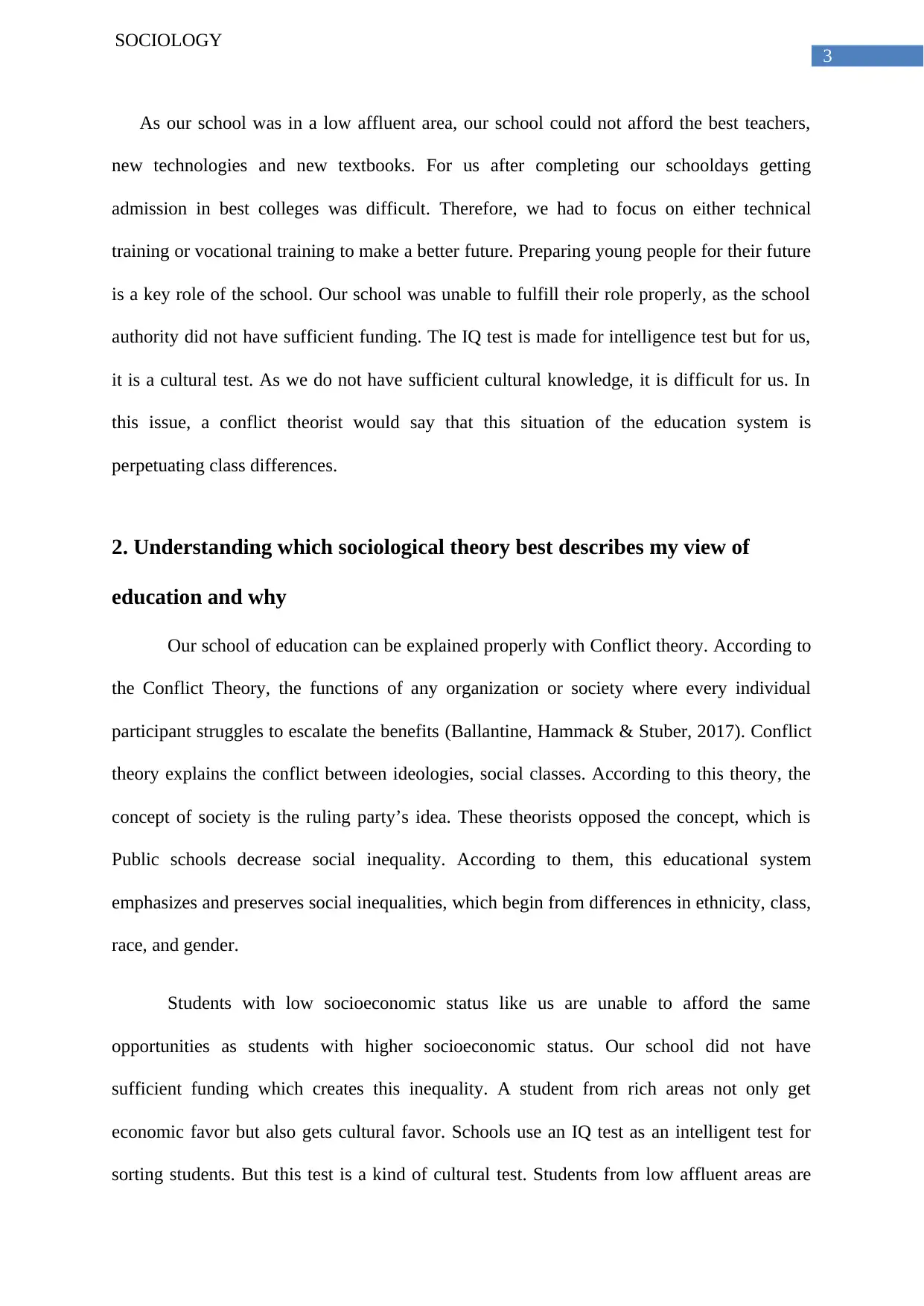
3
SOCIOLOGY
As our school was in a low affluent area, our school could not afford the best teachers,
new technologies and new textbooks. For us after completing our schooldays getting
admission in best colleges was difficult. Therefore, we had to focus on either technical
training or vocational training to make a better future. Preparing young people for their future
is a key role of the school. Our school was unable to fulfill their role properly, as the school
authority did not have sufficient funding. The IQ test is made for intelligence test but for us,
it is a cultural test. As we do not have sufficient cultural knowledge, it is difficult for us. In
this issue, a conflict theorist would say that this situation of the education system is
perpetuating class differences.
2. Understanding which sociological theory best describes my view of
education and why
Our school of education can be explained properly with Conflict theory. According to
the Conflict Theory, the functions of any organization or society where every individual
participant struggles to escalate the benefits (Ballantine, Hammack & Stuber, 2017). Conflict
theory explains the conflict between ideologies, social classes. According to this theory, the
concept of society is the ruling party’s idea. These theorists opposed the concept, which is
Public schools decrease social inequality. According to them, this educational system
emphasizes and preserves social inequalities, which begin from differences in ethnicity, class,
race, and gender.
Students with low socioeconomic status like us are unable to afford the same
opportunities as students with higher socioeconomic status. Our school did not have
sufficient funding which creates this inequality. A student from rich areas not only get
economic favor but also gets cultural favor. Schools use an IQ test as an intelligent test for
sorting students. But this test is a kind of cultural test. Students from low affluent areas are
SOCIOLOGY
As our school was in a low affluent area, our school could not afford the best teachers,
new technologies and new textbooks. For us after completing our schooldays getting
admission in best colleges was difficult. Therefore, we had to focus on either technical
training or vocational training to make a better future. Preparing young people for their future
is a key role of the school. Our school was unable to fulfill their role properly, as the school
authority did not have sufficient funding. The IQ test is made for intelligence test but for us,
it is a cultural test. As we do not have sufficient cultural knowledge, it is difficult for us. In
this issue, a conflict theorist would say that this situation of the education system is
perpetuating class differences.
2. Understanding which sociological theory best describes my view of
education and why
Our school of education can be explained properly with Conflict theory. According to
the Conflict Theory, the functions of any organization or society where every individual
participant struggles to escalate the benefits (Ballantine, Hammack & Stuber, 2017). Conflict
theory explains the conflict between ideologies, social classes. According to this theory, the
concept of society is the ruling party’s idea. These theorists opposed the concept, which is
Public schools decrease social inequality. According to them, this educational system
emphasizes and preserves social inequalities, which begin from differences in ethnicity, class,
race, and gender.
Students with low socioeconomic status like us are unable to afford the same
opportunities as students with higher socioeconomic status. Our school did not have
sufficient funding which creates this inequality. A student from rich areas not only get
economic favor but also gets cultural favor. Schools use an IQ test as an intelligent test for
sorting students. But this test is a kind of cultural test. Students from low affluent areas are
Paraphrase This Document
Need a fresh take? Get an instant paraphrase of this document with our AI Paraphraser
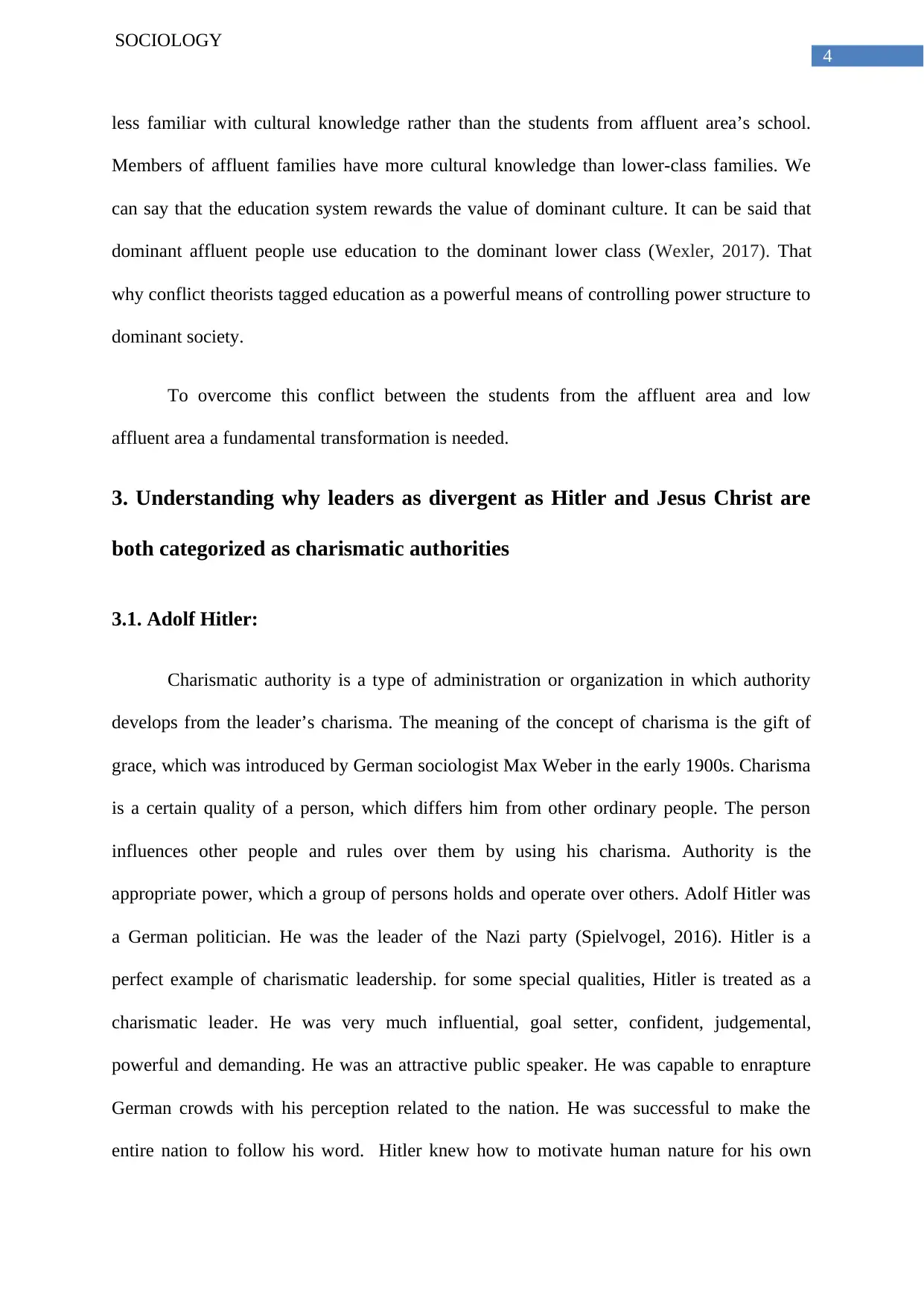
4
SOCIOLOGY
less familiar with cultural knowledge rather than the students from affluent area’s school.
Members of affluent families have more cultural knowledge than lower-class families. We
can say that the education system rewards the value of dominant culture. It can be said that
dominant affluent people use education to the dominant lower class (Wexler, 2017). That
why conflict theorists tagged education as a powerful means of controlling power structure to
dominant society.
To overcome this conflict between the students from the affluent area and low
affluent area a fundamental transformation is needed.
3. Understanding why leaders as divergent as Hitler and Jesus Christ are
both categorized as charismatic authorities
3.1. Adolf Hitler:
Charismatic authority is a type of administration or organization in which authority
develops from the leader’s charisma. The meaning of the concept of charisma is the gift of
grace, which was introduced by German sociologist Max Weber in the early 1900s. Charisma
is a certain quality of a person, which differs him from other ordinary people. The person
influences other people and rules over them by using his charisma. Authority is the
appropriate power, which a group of persons holds and operate over others. Adolf Hitler was
a German politician. He was the leader of the Nazi party (Spielvogel, 2016). Hitler is a
perfect example of charismatic leadership. for some special qualities, Hitler is treated as a
charismatic leader. He was very much influential, goal setter, confident, judgemental,
powerful and demanding. He was an attractive public speaker. He was capable to enrapture
German crowds with his perception related to the nation. He was successful to make the
entire nation to follow his word. Hitler knew how to motivate human nature for his own
SOCIOLOGY
less familiar with cultural knowledge rather than the students from affluent area’s school.
Members of affluent families have more cultural knowledge than lower-class families. We
can say that the education system rewards the value of dominant culture. It can be said that
dominant affluent people use education to the dominant lower class (Wexler, 2017). That
why conflict theorists tagged education as a powerful means of controlling power structure to
dominant society.
To overcome this conflict between the students from the affluent area and low
affluent area a fundamental transformation is needed.
3. Understanding why leaders as divergent as Hitler and Jesus Christ are
both categorized as charismatic authorities
3.1. Adolf Hitler:
Charismatic authority is a type of administration or organization in which authority
develops from the leader’s charisma. The meaning of the concept of charisma is the gift of
grace, which was introduced by German sociologist Max Weber in the early 1900s. Charisma
is a certain quality of a person, which differs him from other ordinary people. The person
influences other people and rules over them by using his charisma. Authority is the
appropriate power, which a group of persons holds and operate over others. Adolf Hitler was
a German politician. He was the leader of the Nazi party (Spielvogel, 2016). Hitler is a
perfect example of charismatic leadership. for some special qualities, Hitler is treated as a
charismatic leader. He was very much influential, goal setter, confident, judgemental,
powerful and demanding. He was an attractive public speaker. He was capable to enrapture
German crowds with his perception related to the nation. He was successful to make the
entire nation to follow his word. Hitler knew how to motivate human nature for his own
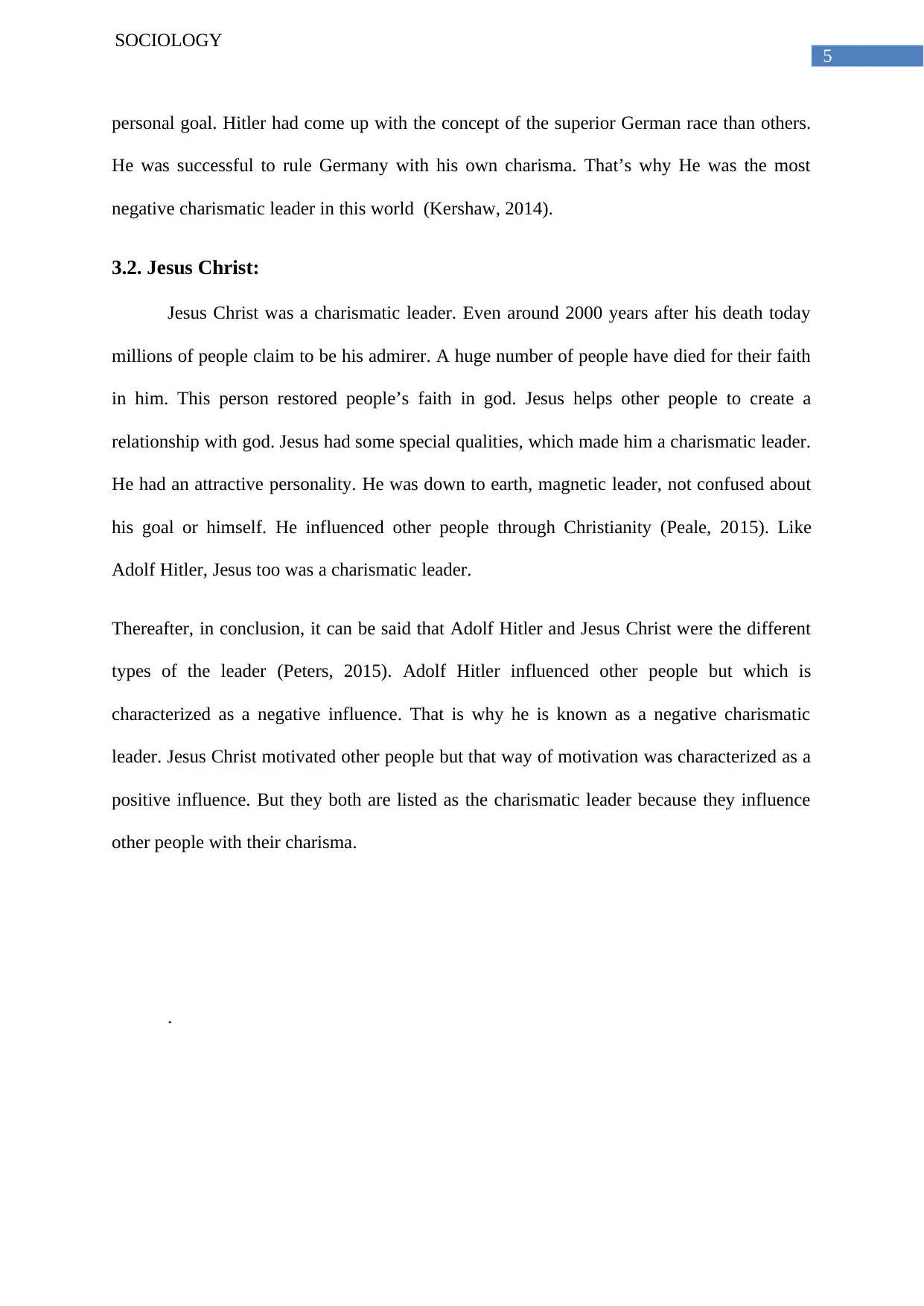
5
SOCIOLOGY
personal goal. Hitler had come up with the concept of the superior German race than others.
He was successful to rule Germany with his own charisma. That’s why He was the most
negative charismatic leader in this world (Kershaw, 2014).
3.2. Jesus Christ:
Jesus Christ was a charismatic leader. Even around 2000 years after his death today
millions of people claim to be his admirer. A huge number of people have died for their faith
in him. This person restored people’s faith in god. Jesus helps other people to create a
relationship with god. Jesus had some special qualities, which made him a charismatic leader.
He had an attractive personality. He was down to earth, magnetic leader, not confused about
his goal or himself. He influenced other people through Christianity (Peale, 2015). Like
Adolf Hitler, Jesus too was a charismatic leader.
Thereafter, in conclusion, it can be said that Adolf Hitler and Jesus Christ were the different
types of the leader (Peters, 2015). Adolf Hitler influenced other people but which is
characterized as a negative influence. That is why he is known as a negative charismatic
leader. Jesus Christ motivated other people but that way of motivation was characterized as a
positive influence. But they both are listed as the charismatic leader because they influence
other people with their charisma.
.
SOCIOLOGY
personal goal. Hitler had come up with the concept of the superior German race than others.
He was successful to rule Germany with his own charisma. That’s why He was the most
negative charismatic leader in this world (Kershaw, 2014).
3.2. Jesus Christ:
Jesus Christ was a charismatic leader. Even around 2000 years after his death today
millions of people claim to be his admirer. A huge number of people have died for their faith
in him. This person restored people’s faith in god. Jesus helps other people to create a
relationship with god. Jesus had some special qualities, which made him a charismatic leader.
He had an attractive personality. He was down to earth, magnetic leader, not confused about
his goal or himself. He influenced other people through Christianity (Peale, 2015). Like
Adolf Hitler, Jesus too was a charismatic leader.
Thereafter, in conclusion, it can be said that Adolf Hitler and Jesus Christ were the different
types of the leader (Peters, 2015). Adolf Hitler influenced other people but which is
characterized as a negative influence. That is why he is known as a negative charismatic
leader. Jesus Christ motivated other people but that way of motivation was characterized as a
positive influence. But they both are listed as the charismatic leader because they influence
other people with their charisma.
.
⊘ This is a preview!⊘
Do you want full access?
Subscribe today to unlock all pages.

Trusted by 1+ million students worldwide
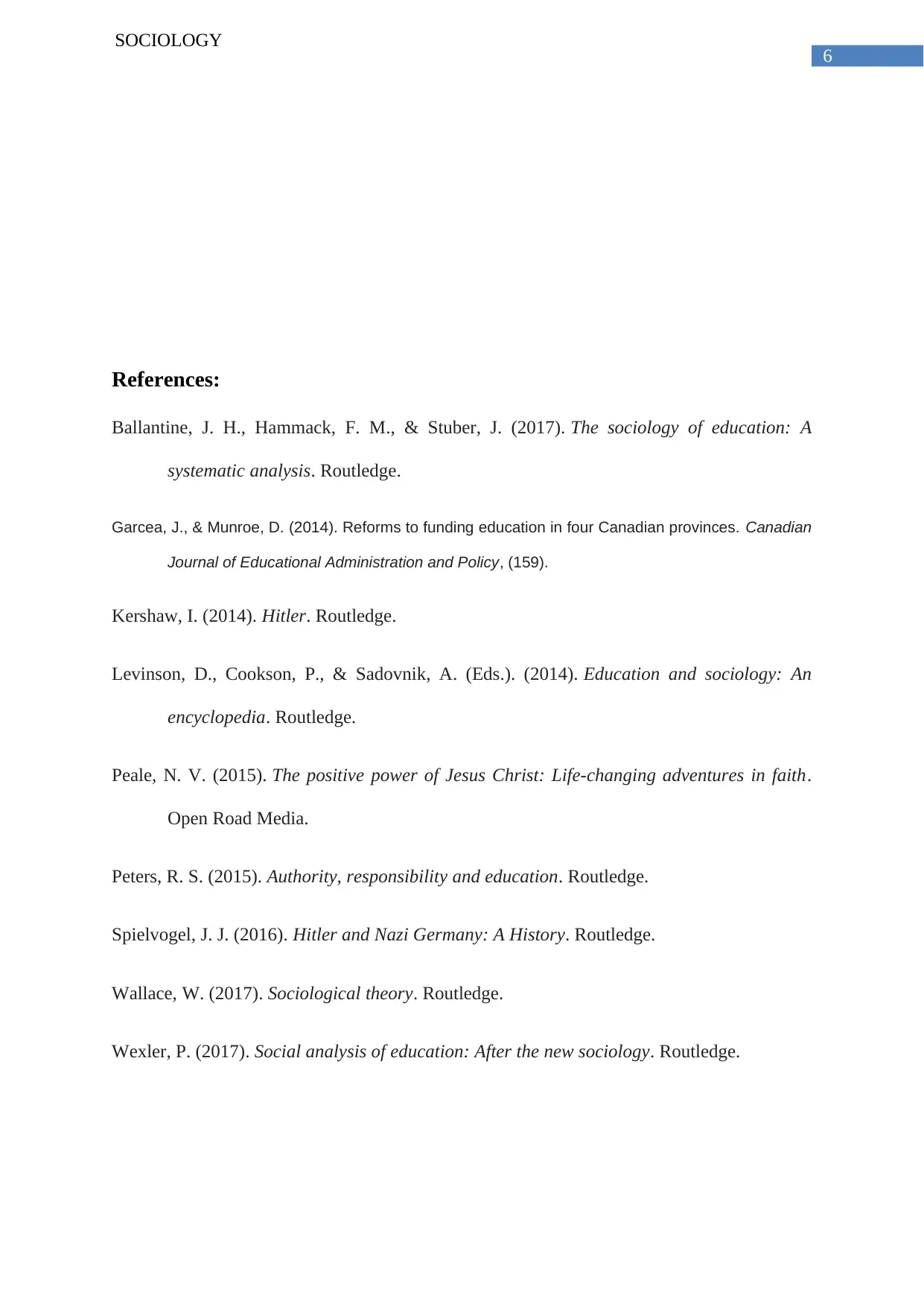
6
SOCIOLOGY
References:
Ballantine, J. H., Hammack, F. M., & Stuber, J. (2017). The sociology of education: A
systematic analysis. Routledge.
Garcea, J., & Munroe, D. (2014). Reforms to funding education in four Canadian provinces. Canadian
Journal of Educational Administration and Policy, (159).
Kershaw, I. (2014). Hitler. Routledge.
Levinson, D., Cookson, P., & Sadovnik, A. (Eds.). (2014). Education and sociology: An
encyclopedia. Routledge.
Peale, N. V. (2015). The positive power of Jesus Christ: Life-changing adventures in faith.
Open Road Media.
Peters, R. S. (2015). Authority, responsibility and education. Routledge.
Spielvogel, J. J. (2016). Hitler and Nazi Germany: A History. Routledge.
Wallace, W. (2017). Sociological theory. Routledge.
Wexler, P. (2017). Social analysis of education: After the new sociology. Routledge.
SOCIOLOGY
References:
Ballantine, J. H., Hammack, F. M., & Stuber, J. (2017). The sociology of education: A
systematic analysis. Routledge.
Garcea, J., & Munroe, D. (2014). Reforms to funding education in four Canadian provinces. Canadian
Journal of Educational Administration and Policy, (159).
Kershaw, I. (2014). Hitler. Routledge.
Levinson, D., Cookson, P., & Sadovnik, A. (Eds.). (2014). Education and sociology: An
encyclopedia. Routledge.
Peale, N. V. (2015). The positive power of Jesus Christ: Life-changing adventures in faith.
Open Road Media.
Peters, R. S. (2015). Authority, responsibility and education. Routledge.
Spielvogel, J. J. (2016). Hitler and Nazi Germany: A History. Routledge.
Wallace, W. (2017). Sociological theory. Routledge.
Wexler, P. (2017). Social analysis of education: After the new sociology. Routledge.
Paraphrase This Document
Need a fresh take? Get an instant paraphrase of this document with our AI Paraphraser
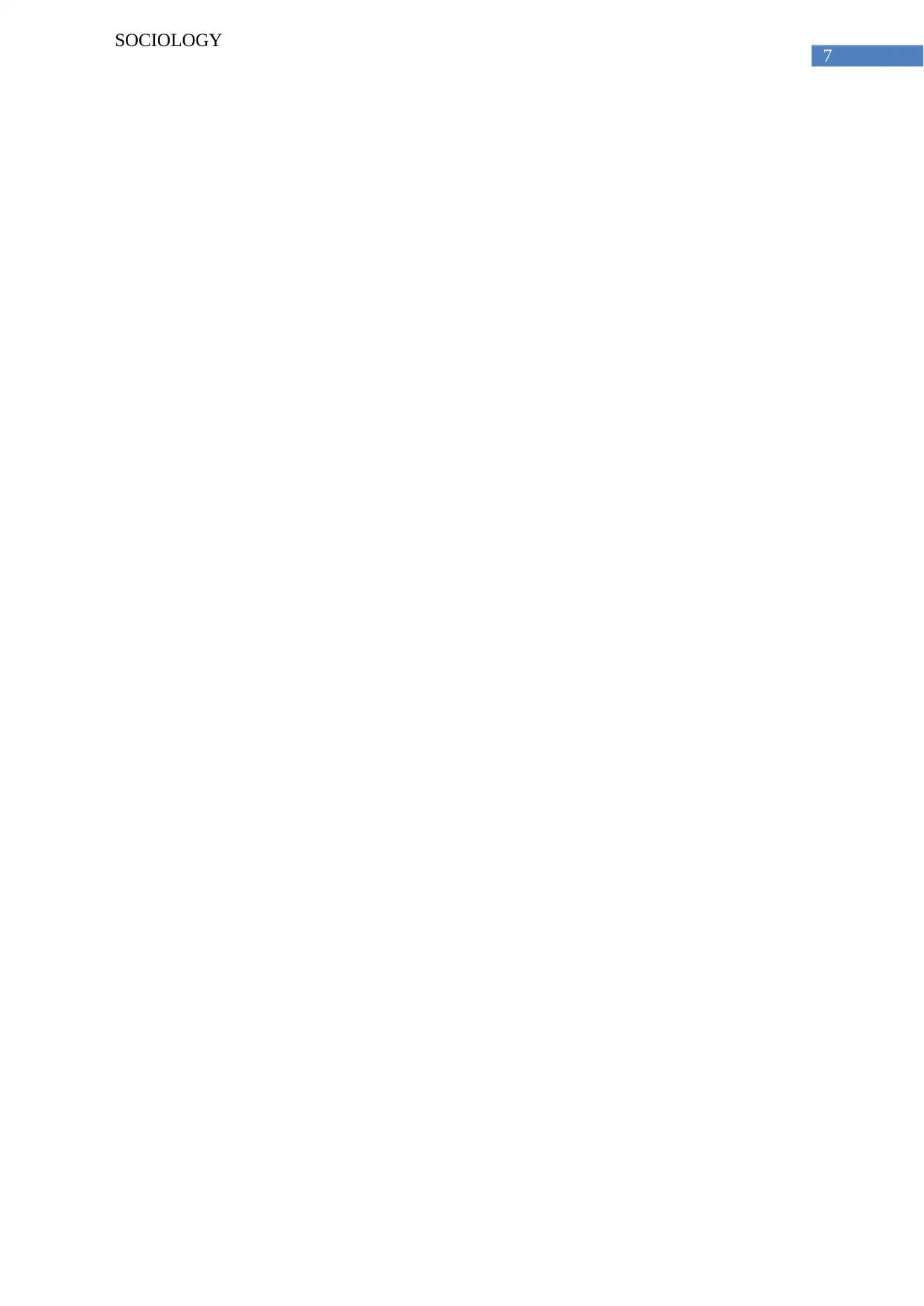
7
SOCIOLOGY
SOCIOLOGY
1 out of 8
Your All-in-One AI-Powered Toolkit for Academic Success.
+13062052269
info@desklib.com
Available 24*7 on WhatsApp / Email
![[object Object]](/_next/static/media/star-bottom.7253800d.svg)
Unlock your academic potential
Copyright © 2020–2025 A2Z Services. All Rights Reserved. Developed and managed by ZUCOL.
